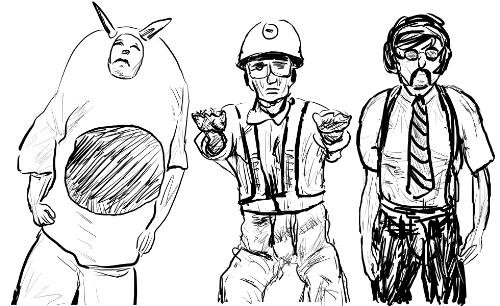
News
HMS Is Facing a Deficit. Under Trump, Some Fear It May Get Worse.

News
Cambridge Police Respond to Three Armed Robberies Over Holiday Weekend

News
What’s Next for Harvard’s Legacy of Slavery Initiative?

News
MassDOT Adds Unpopular Train Layover to Allston I-90 Project in Sudden Reversal

News
Denied Winter Campus Housing, International Students Scramble to Find Alternative Options
BookEnds: ‘Skills’ Sheds ‘Light’ On The Rise Of The Beasties
The narrative history loses steam around “Ill Communication”

The Beastie Boys—the wild dudes from “Sabotage,” the greatest music video of all time, and frat-boy anthem “You Gotta Fight For Your Right to Party”—are classy activists for a free Tibet, in long-term relationships, and producing progressively less relevant material at a progressively slower clip.
Alan Light is fascinated by this story of the three white Jewish kids from New York City who rose to prominence as the first hip-hop group with a number one album on the billboard charts, 1987’s “License to Ill.” To satisfy his interest, the former editor-in-chief of Vibe and Spin decided to go straight to the sources, interviewing all the key participants for his new oral history of the Beasties, “The Skills to Pay the Bills.”
Light is a white boy writer in the midst of the black dominated hip-hop scene, and that must have influenced the choice of the Beasties as his follow-up to “Tupac Shakur.” His main interest is in the early years of Ad-Rock, MCA and Mike D a.k.a. Adam Horowitz (son of playwright Israel Horowitz!), Adam Yauch, and Michael Diamond.
It’s no wonder. Those were the years when they hooked up with two New York University students named Rick Rubin and Russell Simmons, who brought them into the Def Jam fold, and Madonna picked these unknowns to open for her at the height of her popularity. They would get so many boos with their giant inflatable penis and their pussy-centric stage banter that Madonna would get twice the applause when she finally appeared.
As the chronologically organized book gets past the seminal sampling cerebral sounds of “Paul’s Boutique,” Light seems to lose interest. By the stories of the making of “Ill Communication,” the urgency of the narrative seems completely lost. Even the resurgence around 1998’s “Hello Nasty” is curt and obtuse. There is no sense that in the Beasties’ decision to found a record label or work with pioneering samplers the Dust Brothers matters as much as their collaborations with Run-D.M.C. in the late 80s, even though the former choices had much more visible impact than the latter.
Light's point is that the Beasties’ position in the midst of middle-school hip-hop is the unique point in their repertoire. Other people have tried to develop their own sound and have tried to develop their own record label once they had a hit-record. Only the Beasties pioneered white-boys’ involvement in mainstream hip-hop. The current marketplace of rap albums carried almost entirely by the white-suburban market was introduced with the push of “License to Ill”—which they almost called Don't Be a Faggot”—to the top of the charts.
Something that is surprisingly lost amidst the fan-boys stories of emulating Led Zeppelin on tour is analysis of why their music is good and groundbreaking, particularly as to the esoteric sampling base that led the way for Prince Paul and Dr. Dre. It is disappointing that there is no scrutiny of the actual material producing their astonishing ascent.
There is also no real discussion of the influence of their X-Large clothing line, Grand Royal magazine, and record label, which introduced such innovative artists as Luscious Jackson and Sean Lennon.
These aspects are mentioned of course, but they are not properly introduced and are never picked up again. The fact that Mike D’s great journalistic talent gave Grand Royal magazine staying power is interesting—particularly in terms of what it says about the group’s music—but it comes out of nowhere and is never discussed again.
But there’s a lot about Rick Rubin (their original producer and co-founder of Def Jam) being a dick.
The implication of the end is that all their wild-man behavior was just the actions of confused and talented young men looking for direction, which they have now found.
But that they’re boring now doesn’t really satisfy any of the questions brought up throughout the narrative. They seem to have abandoned everything that they used to be interested in without beginning their third act.
Maybe the book was just written at an odd time, but it seems like these pioneers have lost the urge to hit White Castle.
“Skills” is an interesting and involving book, but it doesn’t go deep enough into the group to be anything more than a fun few hours for hardcore fans.
Sometimes, though, that’s enough.
—Staff writer Scoop A. Wasserstein can be reached at wasserst@fas.harvard.edu.
The Skills to Pay the Bills
By Alan Light
Three Rivers Press
Out Now
Want to keep up with breaking news? Subscribe to our email newsletter.
